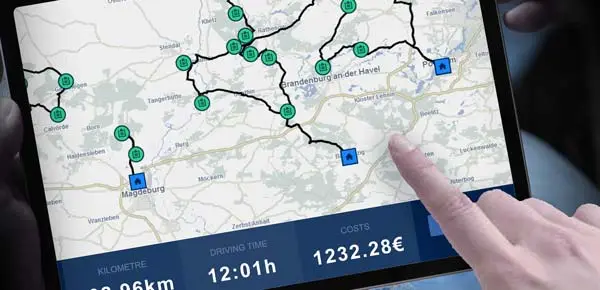
BLOG / SOLUTIONS · FIELD SERVICE ENGINEER
WHAT IS A FIELD SERVICE ENGINEER? TECHNICIAN AND MODERN CUSTOMER ADVOCATE
31 March 2022 · James Alex Waldron
Field Service Engineers (sometimes, technicians/operatives) are categorised as a Mobile Workforce. Providing technical expertise in the field, these employees take on double responsibilities for the company. They not only provide valuable in-person services; they are the most direct contact with your brand. They shape the Customer Experience with an interaction that crosses communication back to head office. In the modern move towards the role of customer advocate, they can provide on-the-spot tips and tricks, 'watch-outs' for the future, and warn that it's time to replace an asset. This hybrid has lead to some field service engineers being referred to as after-sales engineers - especially in installation and commissioning of plant and machinery.
WHAT DOES A FIELD SERVICE ENGINEER DO?
The typical tasks of a Field Service Engineer takes place at the customer's premises. They can also be found at third-party sites when sub-contracted, or are sent to domestic settings. They are responsible for the following tasks in the field:- Assembly, installation and set-up of machines, plants and equipment
- Instructions and training on handling
- Maintenance and servicing according to agreed maintenance contracts
- Troubleshooting, analysis and repair
- Documentation of the work carried out (service reports)
Further sites of operation include offices or factories. Some plants are located far away from buildings, for example a wind turbine or electricity pylon. Field service engineers can literally be forund 'in the field'.
Some service technicians will also spend a portion of their week at head office, working in teleservice as well as in online customer support. There they may evaluate whether an on-site visit to the customer is really necessary or whether the problem can also be solved remotely or with verbal guidance from the on-site staff.
Experienced Field Service Engineers sometimes work closely with research and development departments, as well as quality management and quality assurance. There, they incorporate their practical experience into the development of new models and into improvements and upgrades of existing products.
WHAT TRAINING DOES A FIELD SERVICE ENGINEER NEED?
The job title describes the activities, and is not regulated in the UK. Accordingly, there is no standardised training or prescribed training path to become a field service engineer.However, the following training courses and degree programmes provide a good technical foundation and thus create the prerequisites for working in the field service:
Certification:
- Specialist in metal technology
- Precision mechanic
- Production mechanic
- Industrial mechanic
- Electronic technician or electrician
- Mechatronics technician
- Industrial technologist
Study programmes:
- Plant construction
- Computer engineering
- Electrical engineering
- Engineering
- IT/computer science
- Mechanical engineering
- Mechatronics
- Measuring and control technology
- Process engineering
Depending on the industry of the future employer, subject-specific training or courses of study can also qualify candidates for a job as a Field Service Engineer. In any case, careful training is necessary in order to become familiar with the machines and devices for which the service technician is responsible for installing, maintaining and repairing. Another is consideration of gas, water, and electricty that are found in the service settings.
A driver's license is critical. Depending on the size and nature of the company's products, a heavy goods category (or higher) driver's license is required.
GROWING FOCUS: MODERN SKILLS FOR A GREAT FIELD SERVICE ENGINEER
In addition to specialist knowledge and manual skills, modern demands for exemplary soft skills play a major role in technical field service. Through the application process, companies should not only pay attention to technical understanding, practiced hand movements and appropriate professional training—they must also look at interpersonal and communication skills.Flexibility
A Field Service Engineer travels a lot, every day. This requires flexibility and a true willingness to travel.
Installation and regular maintenance may usually be planned well in advance. Even in reactive repairs and emergency operations there is a regularity to on-call service.
During this time, technical service staff must be available if problems arise. They need an agreement to be paid accordingly for the time that they are on call (please seek your own legal advice). If important customers have serious business continuity problems, night shifts or weekend working may also be required.
Stress Tolerance
If important systems or machines stand still due to a defect, the affected customers are often very tense. As a field service engineer, technicians must be able to deal with such situations and keep a cool head under pressure.
They must not be intimidated by short-tempered personalities and instead mediate in a calming manner. With their excellent technical understanding and the ability to explain the complex processes in a way that everyday users can understand, they ensure that the situation is de-escalated.
Clear Approach
Field service technicians must comply with all important safety regulations even under time pressure and stress. In this way, they not only protect themselves at work, but also everyone who later uses the systems and machines.
False promises have no place with urgent and impatient customers. Instead, a qualified field service engineer must mediate and openly communicate what is technically possible (and what is not).

In addition to devices, modern field service engineers must be able to interact with a range of customers.
Empathy
Empathy makes it easier for field service engineers to work with customers. Through the ability to put themselves in the shoes of others, they not only see the technical side of the job, but also the needs, wishes and fears of their contact.
This helps them to mediate in conflicts and to prevent stressful or charged situations and misunderstandings from arising in the first place. As a representative of a company on site, service technicians ensure good customer relations. They are an important piece of the puzzle for long-term customer loyalty.
Profit protection
In order to be able to make decisions for their company on site, Field Service Engineers not only have to think technically, but also economically. For example, after analysing a fault, they must assess whether a repair should be carried out on site or whether the asset must be removed or replaced there and then.
These decisions should be based on a sound understanding of production chains and capacities. It must be possible to explain decisions in a comprehensible manner to both the customer and their line management.
Independence balanced with team work
The previous point already suggests it: field employees make their own decisions. They must therefore be able to work with authority, independently. In some cases, however, they can use remote help from office staff or use supporting software (see below).
If a major order requires the use of several specialists across a project (sometimes for weeks or months), however, the ability to work in a team is required. Especially when you travel together for a long time or work in a dangerous area where it is particularly important to be able to rely on each other.
WHAT ARE MODERN FIELD ENGINEER PERFORMANCE MEASURES?
In modern technical customer service, service quality and customer satisfaction scores are growing in parallel to cost efficiency and as few device failures as possible. These are in addition to industry standards of compliance and Service Level Agreements (SLA).The work of service technicians should make a positive impact in customer satisfaction surveys. Once again, it should be recognised that field staff represent a company, before negative experiences make their way to public forums. With their performance and their appearance on site, they are influential brand ambassadors.
In technical customer service, there are a number of standard KPIs (Key Performance Indicators) that are used to assess efficiency. These include, for example, time to respond and first-time-fix rate. (Read more about them here KPI in field service.)
The performance of the field service depends not least on good general conditions. This means how well a company's Field Service Management workflows and set, and operate in real terms. This begins with the digital tools, locations, and equipment, and ends with transparent and lean processes. Above all, appropriate and professional route planning and scheduling ensures lower costs and better order processing, with greater productivity.
WHAT DOES A MODERN FIELD SERVICE ENGINEER EARN?
According to Glassdoor, the national average salary for a Field Service Engineer is £29,000 pa. This is on the rise, since a shortage of skilled workers and the move towards repairing, rather than replacing, is becoming increasingly noticeable.In this light, the salary is changeable within certain industries, and the variety of equipment they're responsible for (multi-skilled). A Field Service Engineer has more responsibility when maintaining production plants and industrial machines than when repairing household appliances. This is also reflected in the level of remuneration.
With increasing professional activity and experience, a salary of up to £40,000 is achievable. With more professional experience, expanded specialist knowledge through further training and more responsibility, it can rise to up to £50,000.
Comparatively small industries that require niche and specialist knowledge also often attract rare specialists in their field with above-average remuneration. In addition to the industry, the size of the company and the location are among the salary factors. There are few differences between the B2B and B2C sectors.
OPPORTUNITIES FOR ADVANCEMENT AS A FIELD SERVICE ENGINEER
Depending on personal preference or the vacancies in the company, employees have different perspectives as Field Service Engineer:Those who prefer to work with the customer and who don't mind the flexibility of the field service can take on more and more important customers over time. Valuable experience is reflected in a higher salary. In addition, experience can translate into the role of training and induction of the next generation.
A third alternative is to advance to Field Service Manager. This takes over the coordination and management of the engineers. They are often responsible for selecting new employees (recruiting).
If resources in the field service are scarce, the Field Service Manager may also take on their own appointments. This can mean (rare) on-call duty.
INDUSTRIES FOR FIELD SERVICE ENGINEERS
There are Field Service Engineers in almost every industry where products that are installed, set up and maintained by the company at the customer's site. Most companies in the technical and electrical sectors offer their customers corresponding services including on-site service and must therefore employ at least one, but usually several engineers in the field.Key industries include:
- Automation service provider (including vending)
- Fire protection
- Coffee & Food Services
- Power supply
- Facility Management
- Healthcare & Medical Devices
- Refrigeration, air conditioning and heating technology
- Communication & Office Technologies
- Mechanical and plant engineering
- Technical reports & testing
You can find a more detailed industry overview here.
MODERN TOOLS TO MEET MODERN FIELD SERVICE EXPECTATIONS
In addition to tools and equipment, modern field service requires high quality software. Software for Field Service Engineers can include a wide variety of digital tools. The features and applications support the employees in the core of their work, but also in the administrative processes around it.Field Service Apps
With a mobile application, engineers can, for example, support their customers by digitally capturing a signature directly. This speeds account management processes. With an offline-capable field service app on a smartphone or tablet, engineers always have access to all relevant customer and service information, plus order data such as an asset's service history.
Today, digital or mobile order management makes it much easier for field service to control and document processes. Paperwork is no longer necessary and thanks to the direct connection to the planning system, the Field Service Engineer can arrange a follow-up appointment with the customer, directly on site.
Augmented Reality
Augmented Reality (AR) is increasingly being used in the field. With this technology, reality is enriched with virtual information, usually via glasses.
For example, our customer küchenquelle uses so-called mixed reality glasses (HoloLens) in on-site consultations. The devices project a hologram onto the existing kitchen (or into the empty space), allowing customers to experience and plan their new kitchen solution in 3D, right at home.

Modern software helps with appointment planning.
Technical service uses Augmented Reality in the form of step-by-step instructions displayed live to the field employee. It is also possible to dial in an expert who is not on site, i.e. to have them 'look through' the glasses at the problem.
Predictive Maintenance
Another innovative approach is Predictive Maintenance. It is primarily in the context of Industry 4.0 and the Internet of Things. With predictive maintenance, requirements are determined using process and machine data.
The condition of the devices and systems can be determined precisely using sensor data, so that maintenance can be carried out as required and not simply based on timed maintenance intervals. Problems are identified in good time so that failures can be prevented. At the same time, the company avoids unnecessary maintenance processes.
Read more: More trends in field service management
Dynamic route and tour planning
Good scheduling is crucial for the optimal coordination of orders and operations. Where planning used to be done manually or with Excel, Outlook, and Google Maps, dynamic solutions now ensure greater efficiency. Modern solutions for appointment and route planning assist Field Service Engineers to reduce travel times, easily spend more time with the customer if they require it, and avoid planning errors.
Powered by an optimisation algorithm, the speed and planning accuracy of dispatch is improved enormously. Simply put, if the route planning software can optimise appointments, routes and orders in real time, the Field Service Engineer can better respond to sudden changes throughout the day.
ADVOCATING FOR THE CUSTOMER
If the customer is king, then the Field Service Engineer is kingmaker. The best outcome is when a first-time-fix meets a satisfied customer. Field Service Engineers often feel customer frustration directly. Specific activities and future prospects in field service depend heavily on the industry. Technical innovations, especially across digital tools and digital assistance are already meeting the increasing expectations of customers. The role continues to grow.MODERN TECHNICAL SUPPORT FOR FIELD SERVICE ENGINEERS
To gain an understanding of tools to optimise the field experience and manage risk for your workforce and customers book a short discussion or contact us at info@fastleansmart.com.Read more:
Strengthen Field Service Optimisation with an Ecosystem model
Cost control: Reactive maintenance with Field Service Management software
Field force security with Field Service Safety software

JAMES ALEX WALDRON
UK Marketing Manager
+44(0) 1183 800189
Send email
James Alex Waldron has worked in written communications for over 15 years. Since 2021, he has written for FLS and the Solvares Group on the topics of digital field service transformation and mobile workforce management, and regularly provides insight to the industry press.





